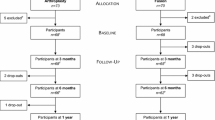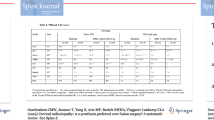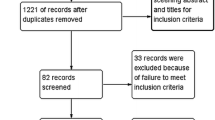Abstract
Randomised controlled trials (RCTs) of cervical disc arthroplasty vs fusion generally show slightly more favourable results for arthroplasty. However, RCTs in surgery often have limited external validity, since they involve a select group of patients who fit very rigid admission criteria and who are prepared to subject themselves to randomisation. The aim of this study was to examine whether the findings of RCTs are verified by observational data recorded in our Spine Center in association with the Spine Society of Europe Spine Tango surgical registry. Patients undergoing fusion/stabilisation or disc arthroplasty for degenerative cervical spinal disease were selected for inclusion. They completed a questionnaire pre-operatively and at 12 and 24 months follow-up (FU). The questionnaire comprised the multidimensional Core Outcome Measures Index (COMI; 0–10 scale) and, at FU, questions on global outcome and satisfaction with treatment (5-point scales, dichotomised to “good” and “poor”), re-operation and patient-rated complications. The surgeon completed a Spine Tango Surgery form. The outcome data from 266 (208 fusion, 58 arthroplasty) out of 284 eligible patients who had reached 12 months FU, and 169 (139 fusion, 30 arthroplasty) out of 178 who had reached 24 months FU, were included. Patients with cervical disc arthroplasty were younger [46 (SD 8) years vs 56 (SD 11) years for fusion; P < 0.05], had less comorbidity (P < 0.05), more often had only mono-segmental pathology (69% arthroplasty, 47% fusion) and only one type of degenerative pathology (69% arthroplasty, 46% fusion). Surgical complication rates were similar in each group (arthroplasty, 1.5%; fusion, 2.6%). The reduction in the COMI score was significantly greater in the arthroplasty group (at 12 months, 4.8 (SD 3.0) vs 3.7 (SD 2.9) points for fusion, and at 24 months 5.1 (SD 2.8) vs 3.8 (SD 2.9) points; each P < 0.05). In the arthroplasty group, a “good” global outcome was recorded in 90% patients (at 12 months) and 93% (at 24 months); in the fusion group the figures were 80 and 82%, respectively (group differences at each timepoint, P > 0.09). Satisfaction with treatment was similar in both groups (89–93%), at each timepoint. In multiple regression analysis, treatment group was of borderline significance as a unique predictor of the change in COMI at FU (P = 0.059 at 12 months, P = 0.055 at 24 months) in a model in which known confounders (age, comorbidity, number of affected levels) were controlled for. Being in the arthroplasty group was associated with an approximately 1-point greater reduction in the COMI score at FU. The results of this observational study appear to support those of the RCTs and suggest that, in patients with degenerative pathology of the cervical spine, disc arthroplasty is associated with a slightly better outcome than fusion. However, given the small size of the difference, its clinical relevance is questionable, especially in view of the a priori more favourable outcome expected in the arthroplasty group due to the more rigorous selection of patients.

Similar content being viewed by others
Notes
Only one surgeon began with the registry in 2004; the remainder began participating in 2005, hence the compliance numbers for the whole Spine Center are only given for 2005–2008.
References
Ahn H, Bhandari M, Schemitsch EH (2009) An evidence-based approach to the adoption of new technology. J Bone Joint Surg Am 91(Suppl 3):95–98
Ahn H, Court-Brown CM, McQueen MM, Schemitsch EH (2009) The use of hospital registries in orthopaedic surgery. J Bone Joint Surg Am 91(Suppl 3):68–72
Anderson PA, Sasso RC, Riew KD (2008) Comparison of adverse events between the Bryan artificial cervical disc and anterior cervical arthrodesis. Spine 33:1305–1312
Anderson PA, Sasso RC, Rouleau JP, Carlson CS, Goffin J (2004) The Bryan Cervical Disc: wear properties and early clinical results. Spine J 4:303S–309S
Anderson PA, Subach BR, Riew KD (2009) Predictors of outcome after anterior cervical discectomy and fusion: a multivariate analysis. Spine 34:161–166
Benson K, Hartz AJ (2000) A comparison of observational studies and randomized, controlled trials. N Engl J Med 342:1878–1886
Bhadra AK, Raman AS, Casey AT, Crawford RJ (2009) Single-level cervical radiculopathy: clinical outcome and cost-effectiveness of four techniques of anterior cervical discectomy and fusion and disc arthroplasty. Eur Spine J 18:232–237
Black N (1996) Why we need observational studies to evaluate the effectiveness of health care. BMJ 312:1215–1218
Blumenthal S, McAfee PC, Guyer RD, Hochschuler SH, Geisler FH, Holt RT, Garcia R Jr, Regan JJ, Ohnmeiss DD (2005) A prospective, randomized, multicenter Food and Drug Administration investigational device exemptions study of lumbar total disc replacement with the CHARITE artificial disc versus lumbar fusion: part I: evaluation of clinical outcomes. Spine 30:1565–1575 discussion E1387–E1591
Bohlman HH, Emery SE, Goodfellow DB, Jones PK (1993) Robinson anterior cervical discectomy and arthrodesis for cervical radiculopathy. Long-term follow-up of one hundred and twenty-two patients. J Bone Joint Surg Am 75:1298–1307
Cleland JA, Childs JD, Whitman JM (2008) Psychometric properties of the Neck Disability Index and Numeric Pain Rating Scale in patients with mechanical neck pain. Arch Phys Med Rehabil 89:69–74
Colditz GA, Miller JN, Mosteller F (1989) How study design affects outcomes in comparisons of therapy. I: medical. Stat Med 8:441–454
Concato J, Shah N, Horwitz RI (2000) Randomized, controlled trials, observational studies, and the hierarchy of research designs. N Engl J Med 342:1887–1892
Denaro V, Papalia R, Denaro L, Di Martino A, Maffulli N (2009) Cervical spinal disc replacement. J Bone Joint Surg Br 91:713–719
Deyo RA, Battie M, Beurskens AJHM, Bombardier C, Croft P, Koes B, Malmivaara A, Roland M, Von Korff M, Waddell G (1998) Outcome measures for low back pain research. A proposal for standardized use. Spine 23:2003–2013
Eck JC, Humphreys SC, Lim TH, Jeong ST, Kim JG, Hodges SD, An HS (2002) Biomechanical study on the effect of cervical spine fusion on adjacent-level intradiscal pressure and segmental motion. Spine 27:2431–2434
Ferrer M, Pellise F, Escudero O, Alvarez L, Pont A, Alonso J, Deyo R (2006) Validation of a minimum outcome core set in the evaluation of patients with back pain. Spine 31:1372–1379 discussion 1380
Freeman BJ (2006) IDET: a critical appraisal of the evidence. Eur Spine J 15(Suppl 3):S448–S457
Freeman BJ, Fraser RD, Cain CM, Hall DJ, Chapple DC (2005) A randomized, double-blind, controlled trial: intradiscal electrothermal therapy versus placebo for the treatment of chronic discogenic low back pain. Spine 30:2369–2377 discussion 2378
Fuller DA, Kirkpatrick JS, Emery SE, Wilber RG, Davy DT (1998) A kinematic study of the cervical spine before and after segmental arthrodesis. Spine 23:1649–1656
George SZ, Hirsch AT (2005) Distinguishing patient satisfaction with treatment delivery from treatment effect: a preliminary investigation of patient satisfaction with symptoms after physical therapy treatment of low back pain. Arch Phys Med Rehabil 86:1338–1344
Goffin J, van Loon J, Van Calenbergh F (2006) Cervical arthroplasty with the Bryan disc: 4-and 6-year results. 21st Annual meeting of the North American Spine Society, Seattle
Grob D, Mannion AF (2009) The patient’s perspective on complications after spine surgery. Eur Spine J 18(Suppl 3):380–385
Hagg O, Fritzell P, Nordwall A, Group SLSS (2003) The clinical importance of changes in outcome scores after treatment for chronic low back pain. Eur Spine J 12:12–20
Heller JG, Sasso RC, Papadopoulos SM, Anderson PA, Fessler RG, Hacker RJ, Coric D, Cauthen JC, Riew DK (2009) Comparison of BRYAN cervical disc arthroplasty with anterior cervical decompression and fusion: clinical and radiographic results of a randomized, controlled, clinical trial. Spine 34:101–107
Hoppe DJ, Schemitsch EH, Morshed S, Tornetta P III, Bhandari M (2009) Hierarchy of evidence: where observational studies fit in and why we need them. J Bone Joint Surg Am 91(Suppl 3):2–9
Horwitz RI (1987) Complexity and contradiction in clinical trial research. Am J Med 82:498–510
Ioannidis JP, Haidich AB, Pappa M, Pantazis N, Kokori SI, Tektonidou MG, Contopoulos-Ioannidis DG, Lau J (2001) Comparison of evidence of treatment effects in randomized and nonrandomized studies. JAMA 286:821–830
Kim SW, Limson MA, Kim SB, Arbatin JJ, Chang KY, Park MS, Shin JH, Ju YS (2009) Comparison of radiographic changes after ACDF versus Bryan disc arthroplasty in single and bi-level cases. Eur Spine J 18:218–231
Landewe R, van der Heijde D (2007) Primer: challenges in randomized and observational studies. Nat Clin Pract Rheumatol 3:661–666
Mannion AF, Elfering A, Staerkle R, Junge A, Grob D, Dvorak J, Jacobshagen N, Semmer NK, Boos N (2007) Predictors of multidimensional outcome after spinal surgery. Eur Spine J 16:777–786
Mannion AF, Elfering A, Staerkle R, Junge A, Grob D, Semmer NK, Jacobshagen N, Dvorak J, Boos N (2005) Outcome assessment in low back pain: how low can you go? Eur Spine J 14:1014–1026
Mannion AF, Porchet F, Kleinstück F, Lattig F, Jeszenszky D, Bartanusz V, Dvorak J, Grob D (2009) The quality of spine surgery from the patient’s perspective: part 1. The Core Outcome Measures Index (COMI) in clinical practice. Eur Spine J 18(Suppl 3):367–373
Mannion AF, Porchet F, Kleinstuck FS, Lattig F, Jeszenszky D, Bartanusz V, Dvorak J, Grob D (2009) The quality of spine surgery from the patient’s perspective: part 2. Minimal clinically important difference for improvement and deterioration as measured with the Core Outcome Measures Index. Eur Spine J 18(Suppl 3):374–379
Miller JN, Colditz GA, Mosteller F (1989) How study design affects outcomes in comparisons of therapy. II: surgical. Stat Med 8:455–466
Morshed S, Tornetta P III, Bhandari M (2009) Analysis of observational studies: a guide to understanding statistical methods. J Bone Joint Surg Am 91(Suppl 3):50–60
Mummaneni PV, Burkus JK, Haid RW, Traynelis VC, Zdeblick TA (2007) Clinical and radiographic analysis of cervical disc arthroplasty compared with allograft fusion: a randomized controlled clinical trial. J Neurosurg Spine 6:198–209
Murrey D, Janssen M, Delamarter R, Goldstein J, Zigler J, Tay B, Darden B (2009) Results of the prospective, randomized, controlled multicenter Food and Drug Administration investigational device exemption study of the ProDisc-C total disc replacement versus anterior discectomy and fusion for the treatment of 1-level symptomatic cervical disc disease. Spine J 9:275–286
Ostelo RW, Deyo RA, Stratford P, Waddell G, Croft P, Von Korff M, Bouter LM, de Vet HC (2008) Interpreting change scores for pain and functional status in low back pain: towards international consensus regarding minimal important change. Spine 33:90–94
Papanikolaou PN, Christidi GD, Ioannidis JP (2006) Comparison of evidence on harms of medical interventions in randomized and nonrandomized studies. CMAJ 174:635–641
Pauza KJ, Howell S, Dreyfuss P, Peloza JH, Dawson K, Bogduk N (2004) A randomized, placebo-controlled trial of intradiscal electrothermal therapy for the treatment of discogenic low back pain. Spine J 4:27–35
Porchet F, Metcalf NH (2004) Clinical outcomes with the Prestige II cervical disc: preliminary results from a prospective randomized clinical trial. Neurosurg Focus 17:E6
Sackett DL (1998) Evidence-based medicine. Spine 23:1085–1086
Sasso RC, Best NM, Metcalf NH, Anderson PA (2008) Motion analysis of Bryan cervical disc arthroplasty versus anterior discectomy and fusion: results from a prospective, randomized, multicenter, clinical trial. J Spinal Disord Tech 21:393–399
Sasso RC, Smucker JD, Hacker RJ, Heller JG (2007) Artificial disc versus fusion: a prospective, randomized study with 2-year follow-up on 99 patients. Spine 32:2933–2940 discussion 2941–2932
Sasso RC, Smucker JD, Hacker RJ, Heller JG (2007) Clinical outcomes of BRYAN cervical disc arthroplasty: a prospective, randomized, controlled, multicenter trial with 24-month follow-up. J Spinal Disord Tech 20:481–491
Schulz KF, Chalmers I, Hayes RJ, Altman DG (1995) Empirical evidence of bias. Dimensions of methodological quality associated with estimates of treatment effects in controlled trials. JAMA 273:408–412
Szpalski M, Gunzburg R, Mayer M (2002) Spine arthroplasty: a historical review. Eur Spine J 11(Suppl 2):S65–S84
White P, Lewith G, Prescott P (2004) The core outcomes for neck pain: validation of a new outcome measure. Spine 29:1923–1930
Acknowledgements
We are grateful to Gordana Balaban, Julian Amacker and David O’Riordan for their excellent work collecting the questionnaire data and managing our quality management system. The study was supported by the Schulthess Klinik Research Fund.
Author information
Authors and Affiliations
Corresponding author
Rights and permissions
About this article
Cite this article
Grob, D., Porchet, F., Kleinstück, F.S. et al. A comparison of outcomes of cervical disc arthroplasty and fusion in everyday clinical practice: surgical and methodological aspects. Eur Spine J 19, 297–306 (2010). https://doi.org/10.1007/s00586-009-1194-3
Received:
Revised:
Accepted:
Published:
Issue Date:
DOI: https://doi.org/10.1007/s00586-009-1194-3




